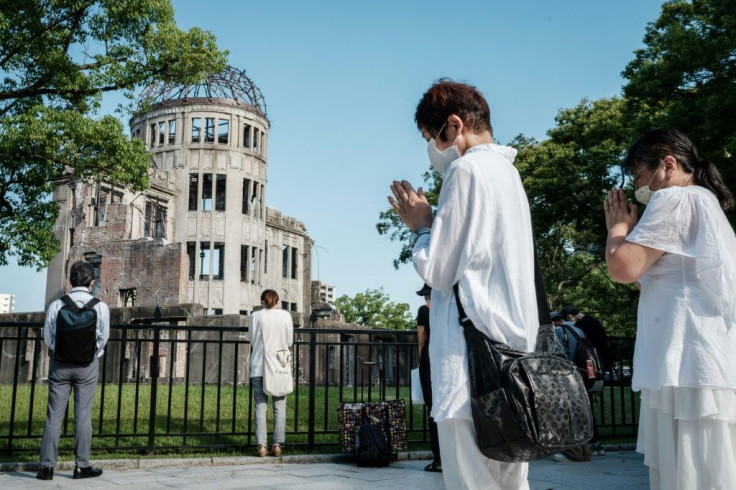Japan Marks Hiroshima Bomb Anniversary With Low-key Ceremonies
Japan on Friday marked 76 years since the world's first atomic bomb attack, with low-key ceremonies and disappointment over a refusal by Olympics organisers to hold a minute's silence.
Survivors, relatives and a handful of foreign dignitaries attended this year's main event in Hiroshima to pray for those killed or wounded in the bombing and call for world peace.
Virus concerns meant the general public were once again kept away, with the ceremony instead broadcast online.
Participants, many dressed in black and wearing face masks, offered a silent prayer at 8:15 am (2315 GMT Thursday), when the first nuclear weapon used in wartime was dropped.
An estimated 140,000 people were killed in the bombing of Hiroshima, which was followed three days later by the atomic bombing of Nagasaki.
On Friday, Hiroshima's mayor called for leaders to visit the cities, and warned "experience has taught humanity that threatening others for self-defence benefits no one".
Prime Minister Yoshihide Suga also delivered a speech in the city, but was later forced to apologise for skipping part of the text -- reportedly on Japan's support of international nuclear disarmament -- apparently by accident.
International Olympic Committee chief Thomas Bach made a trip to Hiroshima before the Games began, to mark the start of an Olympic truce that urges a halt to fighting worldwide to allow the safe passage of athletes.
But organisers stopped short of granting a request from bomb survivors and the city for a minute of silent prayer on Friday morning.

In a letter, Bach said the Olympic closing ceremony would include time to honour victims of tragedy throughout history.
"His letter didn't say anything about our request," Tomohiro Higaki from Hiroshima's peace promotion division told AFP.
"It is disappointing, even though we appreciate that Bach visited Hiroshima to learn the reality of bomb victims," he said.
Bach's controversial visit saw more than 70,000 people signing a petition opposing the trip and accusing him of seeking to "promote the Olympics" despite opposition to the Games.
Yoko Sado, 43, strolling through the peace memorial park with her seven-year-old son, said the lack of visitors because of the pandemic had robbed Hiroshima of a chance to spread a message of peace.
"I'm a bit disappointed," she told AFP. "It would have been a great opportunity."
This year's ceremony is the first since an international treaty banning nuclear weapons entered into force last year when a 50th country ratified the text.
The treaty has not been signed by nuclear-armed states, but activists believe it will have a gradual deterrent effect.
Japan has also declined to sign it, saying the accord will carry no weight without buy-in from nuclear-armed states.
But the country is also in a delicate position as it is under the US nuclear umbrella, with US forces responsible for its defence.
© Copyright AFP 2024. All rights reserved.





















